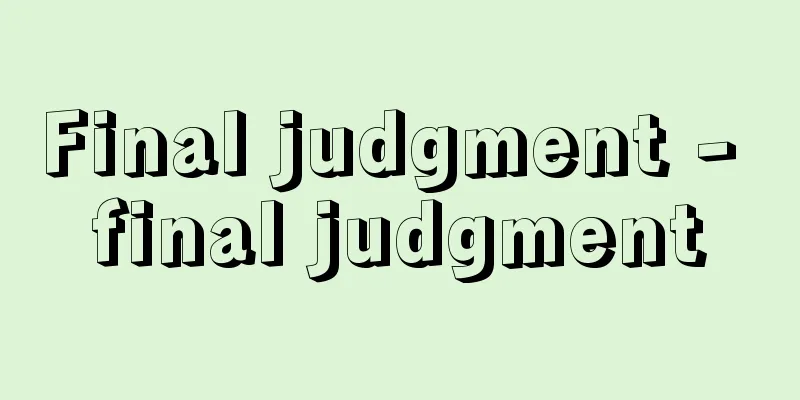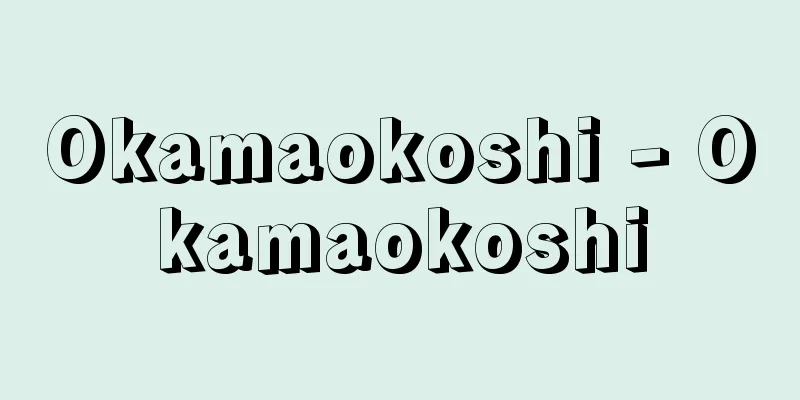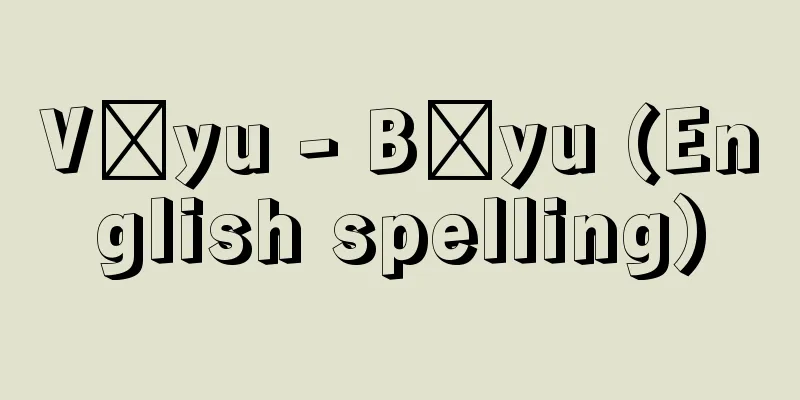Final judgment - final judgment

|
It refers to a judgment (a judgment that has the force of formality) that has been reached in a state where it cannot be attacked by the parties to the litigation through the usual means of appeal (appeal). [Ichiro Uchida] Final judgment in criminal proceedingsUnder the Code of Criminal Procedure, the judgments of the first and second instances become final when the period for filing an appeal (14 days) has elapsed from the date of announcement of the judgment (Criminal Procedure Code, Articles 358, 373, and 414), or when the appeal is abandoned or withdrawn (Criminal Procedure Code, Articles 359 and 360). However, an appeal against a sentence of death penalty or life imprisonment or incarceration cannot be abandoned (Criminal Procedure Code, Article 360-2). Furthermore, when an appeal is made against the judgments of the first and second instances, the original judgment also becomes final when the judgment dismissing the appeal becomes final (Criminal Procedure Code, Articles 375, 385, 386, 395, 396, 408, 414, and 422). If a petition for correction of the judgment is filed by the prosecutor, defendant or defense counsel within the period for filing a petition for correction of the judgment (in principle, within 10 days from the date of the pronouncement of the judgment), the judgment of the appellate court becomes final when a judgment for correction or a decision to dismiss the petition is made. If no petition is filed, the judgment becomes final when the period for filing a petition for correction of the judgment has elapsed (Article 418 of the same Act). No person shall be held criminally responsible for an act for which he or she has already been found not guilty, nor shall he or she be held criminally responsible for the same crime again (Article 39 of the Constitution). If a case has been the subject of a final judgment of guilty, not guilty or acquittal, the judgment must include an acquittal (Article 337 of the Code of Criminal Procedure). As mentioned above, a final judgment not only has the effect under procedural law of making the judgment in a state in which the parties to the litigation cannot attack it through the usual method of filing an appeal (the formal finality of the judgment), but also, if it is a substantive trial, it has the effect under substantive law of determining the existence or non-existence of a specific right to criminal punishment, and if it is a guilty verdict, it has the force of execution. Furthermore, a final judgment of guilt, innocence, or acquittal has the effect under procedural law in subsequent lawsuits, allowing a second trial and denying the judgment on the same subject matter (double jeopardy), and on the other hand, it has the effect of binding the court and the parties in subsequent lawsuits by asserting the content of the final judgment. Summary orders take effect as final judgments once the period for requesting a formal trial (14 days from the date of notice) has elapsed or the request is withdrawn. The same applies when a judgment dismissing a request for a formal trial becomes final (Criminal Procedure Code, Article 470). Extraordinary relief procedures against final judgments include a request for retrial on the grounds that the findings of fact were inappropriate (Criminal Procedure Code, Articles 435 et seq.) and an extraordinary appeal on the grounds of violation of laws and regulations (Criminal Procedure Code, Articles 454 et seq.). [Ichiro Uchida and Morikazu Taguchi] Final judgment in civil litigationUnder the Civil Procedure Code, a final judgment has res judicata effect, enforceability and formative force according to its content. When a settlement or a waiver or admission of a claim is recorded in the record, the record has the same effect as a final judgment (Civil Procedure Code, Article 267). A final judgment has res judicata effect only to the extent that it is included in the operative text (Civil Procedure Code, Article 114, Paragraph 1), and is effective against the parties, their successors after the conclusion of oral argument, or those who hold the subject matter of the claim on their behalf (Civil Procedure Code, Article 115). A special civil action procedure against a final judgment is a suit for retrial (Civil Procedure Code, Articles 338 et seq.). [Ichiro Uchida and Morikazu Taguchi] [Reference items] | | | | | | | | | | |Source: Shogakukan Encyclopedia Nipponica About Encyclopedia Nipponica Information | Legend |
|
通常の不服申立ての方法(上訴)をもって、訴訟関係人が攻撃することのできない状態に達した判決(形式的確定力を有する判決)をいう。 [内田一郎] 刑事訴訟における確定判決刑事訴訟法では、第一審および第二審の判決は、判決が告知された日から上訴の提起期間(14日)を経過することによって確定し(刑事訴訟法358条、373条、414条)、あるいは、上訴の放棄または取下げにより確定する(同法359条、360条)。ただし、死刑または無期の懲役もしくは禁錮に処する判決に対する上訴は、これを放棄することができない(同法360条の2)。さらに、第一審および第二審の判決に対して上訴がなされたときは、上訴棄却の裁判の確定により、原判決も確定する(同法375条、385条、386条、395条、396条、408条、414条、422条)。上告裁判所の判決は、判決訂正申立ての期間内(原則として、判決の宣告があった日から10日以内)に検察官、被告人または弁護人から判決訂正の申立てがあった場合には、訂正の判決もしくは申立てを棄却する決定があったときに確定する。また、申立てがなかった場合には、判決訂正申立ての期間を経過したときに確定する(同法418条)。何人(なんぴと)も、すでに無罪とされた行為については、刑事上の責任を問われないし、また、同一の犯罪について、重ねて刑事上の責任を問われることがない(憲法39条)。事件が有罪、無罪または免訴の確定判決を経たものであるときは、判決で免訴の言渡しをしなければならない(刑事訴訟法337条)。 確定判決は、前記のように訴訟法上の効力として、当該判決を通常の不服申立ての方法をもって、訴訟関係人が攻撃することのできない状態にする(判決の形式的確定力)ばかりでなく、それが実体裁判であれば、実体法上の効力として具体的刑罰権の存否を確定し、かつ、有罪判決であれば、執行力を生じる。また、有罪、無罪または免訴の確定判決は後訴に対する訴訟法上の効力として、同一の訴訟客体について再度の審理、判決を否定し(一事不再理)、他面、後訴において確定判決の内容を主張し、裁判所ならびに当事者を拘束する効力を生ずる。 なお、略式命令は、正式裁判の請求期間(その告知を受けた日から14日)の経過またはその請求の取下げにより、確定判決と同一の効力を生ずる。正式裁判の請求を棄却する裁判が確定したときも同様である(刑事訴訟法470条)。確定判決に対する非常救済手続としては、事実認定の不当を理由とする再審請求(同法435条以下)と、法令の違反を理由とする非常上告(同法454条以下)とがある。 [内田一郎・田口守一] 民事訴訟における確定判決民事訴訟法では、確定判決はその内容にしたがって、既判力、執行力ならびに形成力を生ずる。和解または請求の放棄もしくは認諾を調書に記載したときは、その記載は確定判決と同一の効力を有する(民事訴訟法267条)。確定判決は主文に包含するものに限り既判力を有し(同法114条1項)、当事者、口頭弁論終結後の承継人またはその者のため請求の目的物を所持する者などに対してその効力を有する(同法115条)。確定判決に対する民事特別訴訟手続としては、再審の訴えがある(同法338条以下)。 [内田一郎・田口守一] [参照項目] | | | | | | | | | | |出典 小学館 日本大百科全書(ニッポニカ)日本大百科全書(ニッポニカ)について 情報 | 凡例 |
<<: Fixed date payment - fixed date payment
>>: Definite singularity - Definite singularity
Recommend
Lutra lutra whiteleyi (English spelling) Lutralutrawhiteleyi
…[Tokuji Chiba]. … *Some of the terminology that ...
Shoulder
[1] 〘 noun 〙① The upper part of the joint where th...
carry back
…If an offside player plays or obstructs the oppo...
Tomorrow's Garden City
…In his 1898 book Tomorrow: A Peaceful Course to ...
Ekoin Temple
This is a Jodo sect temple located in Ryogoku, Su...
Kaga Torinoko Paper - Kaga Torinoko Paper
…Nashio Torinoko paper was characterized by its p...
Grey shark
...A general term for marine fish of the genus Ca...
Recession - Fukyou
In a capitalist economy, this refers to a situati...
Fan stone
〘Noun〙 Coal from underground coal seams is carboni...
orbiting geophysical observatory
…Following this spectacular start of the space ob...
Auld Reekie (English spelling) AuldReekie
…The city is known as the Athens of the North bec...
Persimmon orchid - Epipactis thunbergii
A rather large perennial plant of the orchid famil...
Evgeniy Aleksandrovich Mravinskiy
Russian conductor. He studied composition and con...
Sankan
There are three ancient checkpoints that were est...
Shan - Shango
It is the language of the Shan people in Shan Stat...









